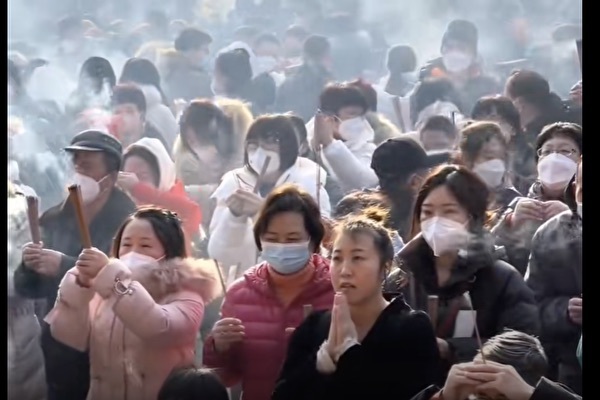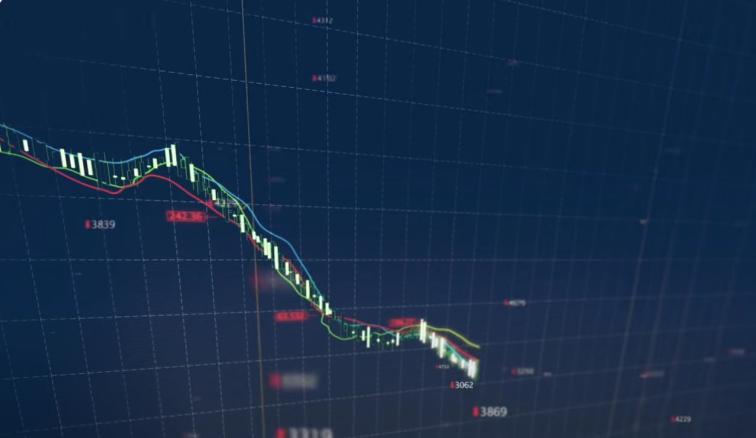On February 10, 2024, the first day of the Lunar New Year, many young people were among the crowd offering incense and praying for blessings at the Yonghe Temple in Beijing. (Screenshot from a video)
[People News] “Why is deflation bad? Doesn’t everyone like lower prices?” This astonishing remark deserves the title of the world’s top quote of 2024. Perhaps this reflects Xi Jinping's unprecedented and unparalleled insights, coupled with the absolute loyalty and cautious implementation by CCP policymakers. Analysts have observed that yet another economic indicator during Xi’s era has significantly surpassed that of Mao Zedong's time.
Bloomberg recently reported that analysts have noted China’s failure to break the cycle of deflation. The country is now in its longest period of sustained price declines since the 1960s. According to most economists, deflation in China is expected to persist for a second consecutive year in 2024. Wall Street banks, including JPMorgan and Citigroup, predict that the deflationary trend might extend into 2025.
The report states that this situation has not been seen since the aftermath of Mao Zedong's Great Leap Forward campaign. That disastrous movement plunged China’s economy into recession and caused a famine that resulted in tens of millions of deaths. Although China’s real economic growth is expected to accelerate slightly in the fourth quarter of 2024, the GDP deflator—an index that measures changes in prices within an economy—is projected to reach -0.2% in 2025, based on the median forecast of 15 analysts surveyed by Bloomberg. This contrasts sharply with the pre-pandemic average of 3.4% over the preceding decade.
The GDP deflator is the ratio of nominal GDP (current price GDP) to real GDP (constant price GDP). Essentially a price index, it provides a comprehensive reflection of overall price trends and serves as a macroeconomic measure of price levels.
Previously, Lingling Wei, chief China correspondent for The Wall Street Journal, wrote that Xi Jinping is completely indifferent to the reality of China’s economic decline. He stubbornly believes that the CCP’s top-down management of the economy and its strategy for a manufacturing resurgence will ultimately allow China to surpass the United States in economic strength. Xi remains obsessed with the belief in “East rising, West declining.”
When policymakers reported concerns about the current deflationary state to Xi, he reportedly responded, “Isn’t deflation a good thing? Aren’t lower prices beneficial?” This left Xi’s circle of experts and officials both amused and frustrated. Since then, the word “deflation” has vanished from their rhetoric to avoid provoking Xi and risking repercussions.
Bloomberg’s report highlights the ignorance and recklessness of CCP leaders, reflecting their crude governance style. For Xi, governing a nation seems akin to wielding a hammer—relentlessly smashing everything in sight, following whatever seems most destructive. State over private enterprise, self-imposed isolation, a Cultural Revolution 2.0—Xi Jinping has already equaled Mao Zedong in several respects. Now, with deflation as another key indicator, it appears Xi is set to surpass his political idol.
To Reinforce the Theory That "Deflation Is Good," China’s National Bureau of Statistics Goes All Out.
On January 17, China’s National Bureau of Statistics (NBS) announced that the country’s 2024 GDP reached 13.49084 trillion yuan, growing 5.0% year-on-year in constant prices. The bureau declared: “Despite increasing external pressures and internal challenges, China’s economic output in 2024 reached a new milestone, exceeding 130 trillion yuan for the first time, solidly maintaining its position as the world’s second-largest economy.”
This announcement was met with delight among officials at all levels in China. Deflation, after all, has been framed as a means for improving the lives of the common people. For Xi Jinping, the target was achieved, and for officials, their positions and caps of authority were secured. Jubilant celebrations likely broke out in Zhongnanhai, as the results provided an explanation for three months of economic stimulus. Across provinces, local governments were swiftly setting their 2025 GDP goals, with Shanghai, Beijing, and eastern coastal regions leading the way in pledging to "secure 5% growth and aim for 6%." Party media quickly followed suit, extolling the "bright economic outlook," boasting achievements, and touting the “Chinese characteristics” narrative.
Overseas perspectives, however, painted a starkly different picture. Agence France-Presse (AFP) remarked, “This is China’s slowest GDP growth in 30 years, excluding the pandemic years. Chinese official GDP data is highly political and often met with skepticism from external observers.”
Nikkei Asia noted, “After adjusting for price changes, real GDP grew by 5.0% year-on-year. However, nominal GDP, which reflects real-life experiences, grew by only 4.2%, a significant slowdown from the 7.4% growth recorded in 2023.”
Voice of America (VOA) cited Louis Kuijs, Chief Asia Economist at HSBC, who argued that the strong growth in the fourth quarter may have been driven by exporters rushing shipments to the U.S. ahead of anticipated tariffs. If the U.S. tariffs take effect, China’s production and exports are likely to decline.
The Wall Street Journal reported, “The strong overall GDP numbers contrast with other indicators, which paint a much weaker economic picture.” China’s Producer Price Index (PPI) has been declining for over two years, while the Consumer Price Index (CPI) in December rose only 0.1%. The combined sales of online shopping platforms Taobao and Tmall grew by just 0.2% year-on-year in 2024. Bank lending growth slowed to 7.6% in December, down from 11% in the same period last year. Nationwide tax revenues fell by 3.8% year-on-year in the first 11 months of 2024. Cement production has declined every month. In Q3 2024, 23% of China’s top-listed companies reported net losses, and over half saw net profits decline year-on-year.
Logan Wright, China Market Research Director at Rhodium Group, told The Wall Street Journal: “Over the past year, the Chinese government has cut interest rates, provided financial support to the stock market and local governments, and hinted at significantly increasing government borrowing in 2025. If economic growth had only slightly slowed from the official 5.2% in 2023, these measures would not have been necessary.”
Rhodium Group estimates China’s 2024 economic growth rate at around 2.8%, far below the official 5% figure. This estimate aligns closely with that of renowned economist Gao Shanwen, who suggests China’s real GDP growth has been just 2% over the past two to three years and projects growth of 3% to 4% over the next three to five years. However, Gao added, “We know that the official numbers will always be around 5%.”
On social media, netizens expressed their skepticism and sarcasm: “Big shoutout to the comrades at the National Bureau of Statistics! Treat them to two drumsticks tonight for their hard work.” “The CCP’s approach to the economy is ironclad: printing money and being stubborn.” “When the Emperor spoils the ending, how can the officials deviate from the script?”
Let’s Take a Look at the Cold, Harsh Reality Behind the Numbers.
According to a report from a Chinese WeChat public account, over 480,000 people in China died by suicide in 2024, averaging 1,260 suicides per day. Post-pandemic debt levels among the population remain alarmingly high, exacerbated in 2024 by a severe housing market crash that left many burdened with insurmountable debt. This figure represents only publicly reported data; actual numbers may be 3 to 5 times higher, with approximately 2.5 million attempted suicides annually. The main causes of suicide fall into five categories: stock market losses, unemployment or underemployment, unfinished housing projects, individuals with no income or support, and overwhelming debt.
In 2024, there were approximately 500 protest events daily across China, most arising from economic grievances or social injustices. The year has also been dubbed a "Zhang Xianzhong Year," referencing a historical figure associated with chaos and tragedy. According to data collected by X user @李老師不是你老師, from late 2023 to November 19, 2024, there were 100 “Zhang Xianzhong incidents” nationwide, each resulting in varying numbers of casualties. The deadliest was the November 11 Zhuhai vehicular attack, which state media reported caused 35 deaths and 43 injuries.
China’s government owed enterprises a staggering 12 trillion yuan in unpaid debts in 2024. According to the Supreme People’s Court, national courts handled approximately 1,000 criminal cases for refusal to pay wages and around 82,000 civil cases for wage recovery in 2024, with only 1.72 billion yuan successfully recovered.
As of November 19, 2024, the number of individuals officially labeled as "dishonest persons subject to enforcement" reached over 8.4 million. Data from the China Index Academy revealed that 768,000 properties were listed for judicial auction nationwide in 2024.
First Financial Daily reported that China’s Ministry of Finance data showed non-tax government revenue increased by 17% year-on-year in the first 11 months of 2024, with October and November growth exceeding 40%. Provincial-level data reveals that some regions experienced double-digit growth in fines and confiscations. A provincial internal report published by the Guangdong Publishing Group in October 2024 disclosed that nearly 10,000 enterprises in Guangdong had been subjected to "extraterritorial enforcement" since 2023, a practice colloquially known as "deep-sea fishing."
In 2024, over 14,600 Chinese semiconductor companies went bankrupt. According to data from Tianyancha, over 30,000 energy storage enterprises were in abnormal states such as deregistration, suspension, or liquidation. In the first half of the year, 1.056 million catering-related enterprises were canceled or revoked. According to the results of China’s fourth and fifth economic censuses, the number of jobs at foreign enterprises in China fell by 7.833 million from 2019 to 2023. Over the past two years, major multinational tech companies such as Cisco, Amazon, Microsoft, and IBM either exited or significantly reduced their operations in China.
As for the real figures on unemployment, the number of people withdrawing from social insurance, and deaths related to COVID-19 in 2024, the opacity of CCP information makes it impossible to obtain accurate data. However, each number is likely to be shocking.
GDP falsification by the CCP is no longer surprising. In the past, it was “officials produce the numbers, and numbers produce the officials.” Now, it’s “officials must protect the numbers so the numbers can protect the officials.” As for the well-being of the people and the living conditions of the "human mines," neither the CCP nor Xi Jinping shows any concern.
(People News Exclusive)











News magazine bootstrap themes!
I like this themes, fast loading and look profesional
Thank you Carlos!
You're welcome!
Please support me with give positive rating!
Yes Sure!